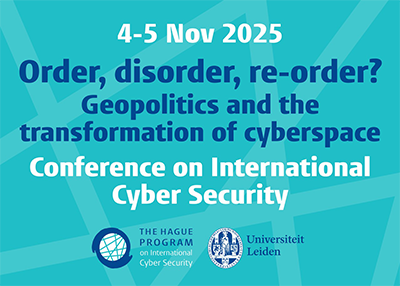
Photos and Conference Report | 2024 Conference on International Cyber Security
From 12-13 November 2024, we held our seventh annual conference, the third as The Hague Program on International Cyber Security on Democracy and Cyberspace. We were joined by academics and other interested participants from across the world, for two days filled with three fantastic keynotes and 22 paper presentations during the parallel sessions.
The conference was opened with a short welcome by Dennis Broeders, Full Professor of Global Security and Technology and Senior Fellow of our Program at the Institute of Security and Global Affairs, Leiden University. James Pamment, Associate Professor and Director of the Lund University Psychological Defence Research Institute, kicked off the day with his keynote on Information, hybrid, and cyber: estranged siblings? During this first day, there were also panels on platform governance in democratic societies, AI safeguarding or usurping democracy, influence operations and threats to democracy, and big tech and democracy. The day ended with a keynote by Marietje Schaake, International Policy Director at Stanford University Cyber Policy Center and International Policy Fellow at Stanford’s Institute for Human-Centered Artificial Intelligence, related to her new book, on going from vulnerability to stability and why we need to stop the tech coup and protect democracy.
The second day included four parallel sessions, on how national politics shape state-platform relations, resistance, regulation and resignation and human rights in cyberspace, safeguarding digital democracy including national perspectives and approaches, and the power and peril of information in cyber conflict. In the morning, Lise Andersen, Postdoctoral researcher with the EU Cyber Direct project, presented the edited volume Emerging and Disruptive Digital Technologies: National, Regional, and Global Perspectives, with authors Chee Hae Chung, Walter Britto Gaspar, and Jakob Bund. Ron Deibert, Director of The Citizen Lab at the Munk School of Global Affairs and Public Policy, University of Toronto, gave the last and closing keynote of the conference, on digital parasites and mapping the new frontiers of espionage, subversion and Dark PR.
Finally, our best paper award this year was awarded during the closing of the conference by Dennis Broeders to Fabiola Schwarz and Maurice Philip Schumann for their paper “Between Net Neutrality and Networked Control – How International Economic Relations Shape Digital Authoritarianism”. They both win a ticket, travel and accommodation to next year’s conference in November 2025.















































































_400x286.png)



















































_400x286.jpg)



